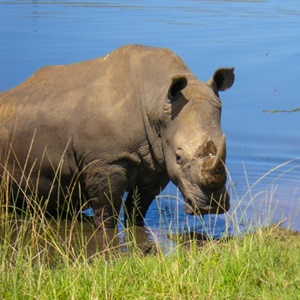WESSA awards highlight critical rhino conservation efforts

2016-09-20 08:42 - Louzel Lombard
The WESSA (Wildlife and Environment Society of South Africa) paid tribute to environmental achievements of the past year while highlighting the importance of community-driven conservation efforts at the recent WESSA award.
The awards were presented at the organisation’s 90th annual general meeting, which was hosted by the WESSA’s Lowveld membership branch at Skukuza in the Kruger National Park on Saturday, 17 September.
In addition to the awards ceremony, roleplayers in conservation shared personal and professional insights into their work on a variety of important projects.
Chris Galliers, WESSA’s Senior Manager for Wildlife & Conservation Initiatives, spoke specifically about WESSA’s Rhino Initiative work, saying South Africans should take ownership of our natural heritage. "Local communities, in particular, need to become involved and benefit from our remarkable biodiversity," he says.
Galliers also heads up WESSA's rhino initiative, which was established in early 2010 to raise funds and awareness, and to contribute towards a number of important national intervention strategies to secure wild rhino populations, forever.
Since, WESSA has done work across many of the major rhino populated provinces. A particular focus area is in KwaZulu-Natal, Mpumalanga and Limpopo provinces (Kruger National Park complex) which, when combined, houses the majority of the world’s rhinos.
"Poachers operate freely over the landscape and are not inhibited by protected areas, provincial or international boundaries. Therefore stakeholder coordination is vital. Without improved communication, stronger support networks and an integrated approach across traditional boundaries, the war against poaching will never be won," Galliers says.
These 7 Anti-rhino poaching interventions were implemented over the past year:
Engagements have taken place with international communities – these include Western governments as well as the former president of Mozambique, Joaquim Chissano and his foundation, the Chissano Foundation.
Over 2000 copies of the special Rhino issue of EnviroKids Magazines were handed out to children in South Africa, Swaziland and Mozambique. The magazine is both an educational teaching aid and a valuable tool to help sensitise children to the value of rhinos and what is happening on the ground to this charismatic species. WESSA believes that educating the youth, especially those in close proximity to the poaching hotspots, is a critical component of a multi-pronged approach. WESSA is grateful to Kingsley Holgate for his support in distributing the magazine to a huge number of schools.
The piloting of a number of rhino tracking devices was initiated to assist in increasing the effectiveness of anti-poaching efforts. These include satellite tracking ankle collars for rhinos which are under threat. The aim is to get accurate information on the preferred areas of the rhinos’ habitat which will allow for more effective deployment of rangers.
WESSA sponsored a critical skill training course for 12 rangers in Zululand which focused on tactical tracking training.
They contributed to information gathering around the Kruger National Park which led to a number of successful arrests of suspected rhino poachers.
A Wildlife Crime and Information Mapping workshop for reserve managers, was conducted in the Lowveld.
WESSA provided over 40 DNA kits to rhino owners for registering their rhino onto the Rhino DNA database system (RhoDIS). The purpose of RhoDIS is for as many of South Africa’s wild rhino population (private and public) to be registered for assisting in prosecutions and the genetic management of the metapopulation.
The WESSA Awards, which have been presented since 1974, enable WESSA to recognise and honour those who have made a significant contribution to the environmental conservation or environmental education sector in South Africa over the past year in an exceptional and sustained manner.
The awards, and emphasis on southern Africa's rhino population comes ahead of the upcoming 17th Conference of the Parties at the Convention on International Trade in Endangered Species, or CITES, set to take place in Johannesburg from 24 September to 5 October this year at the Sandton Convention Centre.
Ahead of the globally significant conservation convention, SA's Minister of Environmental Affairs Edna Molewa highlighted ways in which SA's rhinos have been protected in the past year through aggressive and inclusive conservation efforts.
Molewa released a statement reporting on the progress in the implementation of the Integrated Strategic Management of Rhinoceros, saying while the rhinos' are being spared more, the fight to save their lives is becoming more and more intense.

